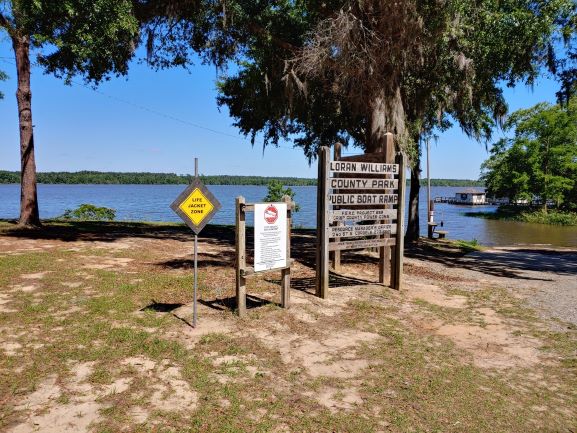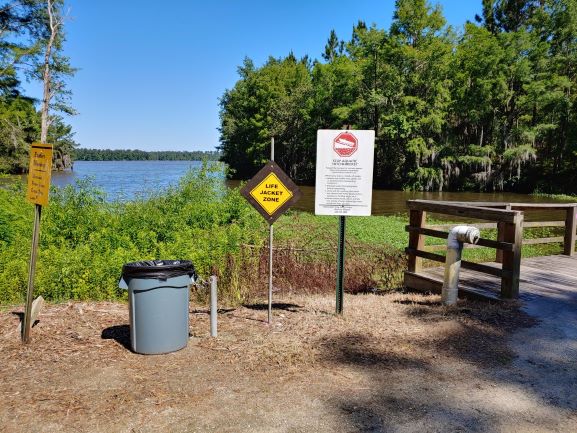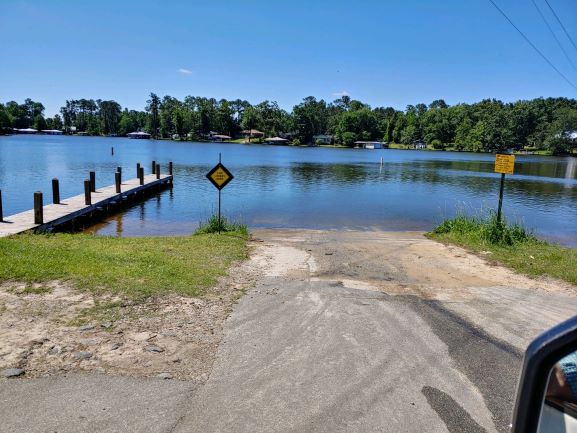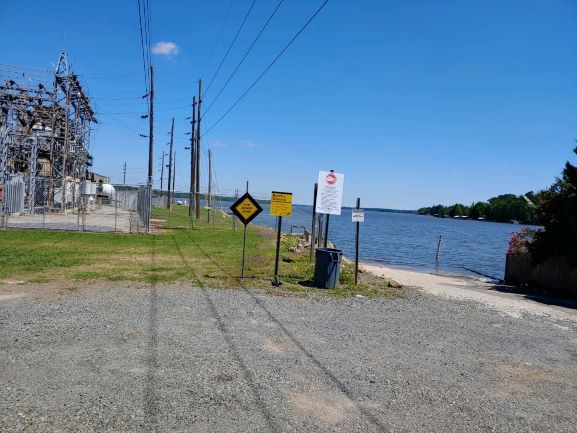Boating Safety
Vessel Safety Checks
FOR THE COMMUNITY WE OFFER FREE VESSEL SAFETY CHECKS.
A certified U.S.
Coast Guard Auxiliary Vessel Examiner will check your vessel, in or
out of the water, for Coast Guard required equipment. If you have
everything required we will issue you a sticker.
REMEMBER TO GET YOUR VESSEL SAFETY CHECK FOR THIS YEAR!
For more information on Vessel Safety Checks
Boating Safety Education
U.S.
Coast Guard Auxiliary boating courses provide instruction to boaters at all levels, from
the fundamental to the advanced. Find the right course for you!
For the latest boating safety news, please click on the links below.
The U.S. Coast Guard Auxiliary Recreational Boating Safety Outreach Website
https://wow.uscgaux.info/content.php?unit=B-DEPT
U.S. Coast Guard Office of Boating Safety
Always Wear Your Life Jackets!
Flotilla 27 and Crisp County remind the public to always wear your life jackets.




Cellular Phones On Boats
A message from Robert Rohr, Flotilla 27 FSO-MS:
As inland boaters trailer their boats to the coast this summer, many may rely on their cell phones for emergency communications offshore. The Coast Guard does not advise relying on cell phones as they cannot communicate with rescue vessels, coverage is limited, only one party can hear your distress call, and the Coast Guard may have difficulty finding your location on the water. Use a VHF radio with Channel 16 for emergency calls.
Please refer to the Consumer Fact Sheet written by the U.S. Coast Guard.
https://www.navcen.uscg.gov/
U.S. Coast Guard CONSUMER FACT SHEET
Office of Navigation Safety and Waterway Services
Washington DC 20593-0001
CELLULAR TELEPHONES ON BOATS
The Coast Guard does not advocate cellular phones as a substitute
for the regular maritime radio distress and safety systems
recognized by the Federal Communications Commission and the
International Radio Regulations -- particularly VHF maritime
radio. However, cellular phones can have a place on board as an
added measure of safety.
CELLULAR PHONE LIMITATIONS IN AN EMERGENCY
o Cellular phones generally cannot provide ship to ship safety
communications or communications with rescue vessels. If you
make a distress call on a cellular phone, only the one party
you call will be able to hear you.
o Most cellular phones are designed for a land-based service.
Their coverage offshore is limited, and may change without
notice.
o Locating a cellular caller is hard to do. If you don't
know precisely where you are, the Coast Guard will have
difficulty finding your location on the water.
Note: In some areas, however, cellular providers have
established a special code (*CG) which, if you are in range, will
connect you directly to a Coast Guard Operations Center. This
service may only work with the carrier to which you have
subscribed.
CELLULAR/VHF MARINE RADIO COMPARISON
Cellular phones do provide the convenience of simple,
easy-to-use, inexpensive, private and generally reliable
telephone service to home, office, automobile or other locations.
Placing a shore-to-ship call to someone with a cellular telephone
is especially convenient. However, you cannot use your cellular
phone outside the United States, and you may need a special
agreement with your carrier to use it outside that carrier's
local service area.
VHF marine radios were designed with safety in mind. If you are
in distress, calls can be received not only by the Coast Guard
but by ships which may be in position to give immediate
assistance. A VHF marine radio also helps ensure that storm
warnings and other urgent marine information broadcasts are
received. The Coast Guard announces these broadcasts on VHF
channel 16. Timely receipt of such information may save your
life. Additionally, your VHF marine radio can be used anywhere
in the United States or around the world.
On VHF radios, however, conversations are not private and
individual boats cannot be assigned a personal phone number. If
you are expecting a call, channel 16 or the marine operator's
working channel must be continually monitored.
SHOULD YOU RELY ON A CELLULAR PHONE EXCLUSIVELY?
Actually there is no comparison between cellular phones and VHF
marine radio. They normally provide different services. The
cellular phone is best used for what it is, an on board telephone
-- a link with shore based telephones. A VHF marine radio is
intended for communication with other ships or marine
installations -- and a powerful ally in time of emergency.
If you have a portable or hand held cellular telephone, by all
means take it aboard. If you are boating very far off shore, a
cellular phone is no substitute for a VHF radio. But, if you are
within cellular range, it may provide an additional means of
communication.
--------------
Float Plans
Whether you are operating a kayak or a large powered boat, a float plan is a good first step towards safe boating practices. The U.S. Coast Guard has on the USCG Boating Safety website a PDF form. Remember to leave a hard copy or digital copy of the Float Plan with a responsible person on shore. Also, remember to carry the Float Plan with you to share with any crew members or guests.
For more information about Float Plans and access to the digital form, please refer to the following link: https://www.uscgboating.org/recreational-boaters/floating-plan.php
"Inflatable Life Jackets: Everything You Need To Know"
A new 9-minute video regarding inflatable life jackets has been released
recently by The Corps Foundation and the U.S. Army Corps of Engineers.
The video is titled "Inflatable Life Jackets: Everything You Need To
Know" and is available on YouTube at:
https://www.youtube.com/watch?v=g5eniRI0mXM
The video was also posted on the Please Wear It Facebook page on
Friday, October 11, 2019. Please share this video with friends and
followers on your Facebook pages.
This video is a great resource that can used to educate and remind family, friends, visitors, employees, and others on the proper care and maintenance of inflatable life jackets.
"Wear It Out" Challenge
This year, the Safe Boating Campaign is promoting a New Social Change Initiative: “Wear It Out”
*WEAR IT OUT CHALLENGE* - A real boater is always ready for the water. A real boater “wears it out”. Real boaters always wear their life jacket when they’re on the water – just like you always wear your seat belt in a vehicle.
The “Wear It Out Challenge” shows the passion that boaters have for the water, so much so that that they wear their life jacket even when doing day-to-day activities – such as walking a dog, brushing their teeth, or eating out with friends.
For more information
on the Wear It Out challenge please click the following link: https://safeboatingcampaign.
New Life Jacket Labels
A message from the National Safe Boating Council, Safe Boating Campaign about the new life jacket labels.
Did you know there is a new life jacket
label? The label is being phased in, and you may see it printed on the inside
of a new life jacket. The new label DOES NOT make obsolete life jackets with
the old label. Always look for a life jacket that is U.S. Coast Guard approved.
Remember, the best life jacket is one you wear! Your life jacket should be
appropriate for the water activity and in good condition. Life jackets with a
tear, broken pieces, or buoyancy loss should be disposed.
Download our latest infographic
to learn how to read the new life jacket label and visit safeboatingcampaign.com/life-jackets
for more information.
You can also click on the links below from the National Safe Boating Council, Safe Boating Campaign for information about the new labels for life jackets.
https://safeboatingcampaign.com/life-jackets/
https://safeboatingcampaign.com/news/infographic-available-new-life-jacket-label/
Engine Cutoff Switches
A message from the U.S. Coast Guard:
“On April 1, 2021 a new federal law goes into effect that requires the operator of a boat with an installed Engine Cut-Off Switch (ECOS) to use the ECOS link. The link is usually a coiled bungee cord lanyard clipped onto the operator's person, Personal Flotation Device (PFD) or clothing and the other end attached to the cut-off switch, but there are plenty of variations on the market, including electronic wireless devices. The law applies on all "Navigable Waters of the US.””
For more information, please click on the link below from the U.S. Coast Guard Boating Safety website.
https://uscgboating.org/recreational-boaters/engine-cut-off-devices.php
New Fire Extinguisher Regulations
On April 20, 2022, new fire extinguisher regulations will go into effect. These new regulations are regarding a change in the fire extinguisher expiration dates and the minimum classification of fire extinguishers carried aboard newer boats.
For more information, please click on the link below from the U.S. Coast Guard Boating Safety website.
https://uscgboating.org/recreational-boaters/fire-extinguisher-faq.php